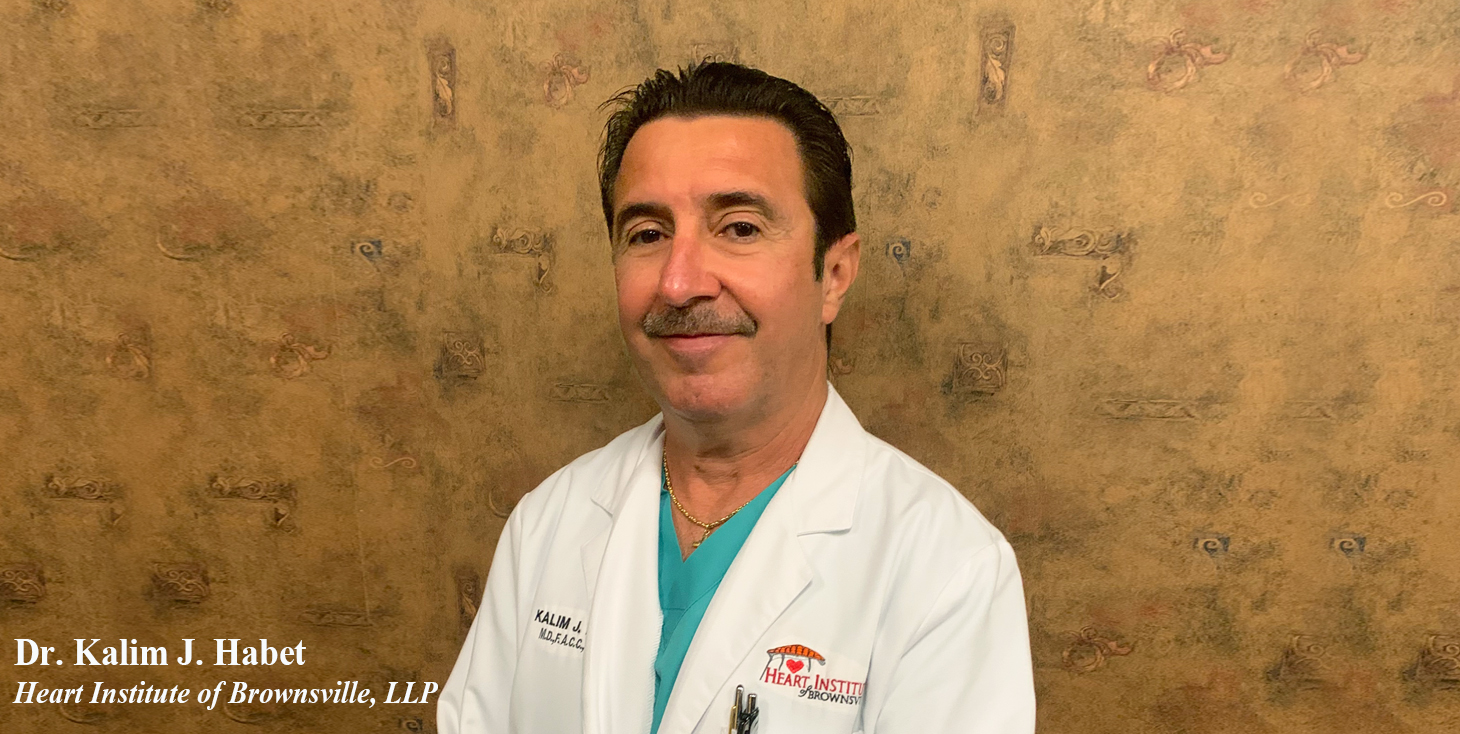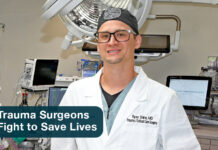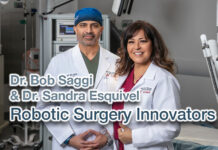He is the Co-Founder of the Heart Institute of Brownsville, LLP
By Roberto Hugo Gonzalez
Dr. Habet was born in Belize, Central America (formerly British Honduras). He is a Cardiovascular Disease and Critical Care medical professional. He practiced in Chicago for eight years before making the journey to Brownsville, Texas in 1977.
Not only did he come with a much-needed specialty, but he is fluent in English and Spanish, the two languages favored by Valley residents.
Dr. Habet is a down to earth professional, with more than thirty-one years of experience in his field. He is also a Clinical Adjunct Professor, Department of Medicine at the University of Texas Health Science Center-San Antonio, and the Co-Founder of Heart Institute of Brownsville, LLP.
He did his fellowship in Cardiovascular and Critical Care Medicine at the Rush University Medical Center of Chicago Illinois. He completed his residency in Internal Medicine at Saint Francis Hospital of Evanston, Illinois. an affiliate of Loyola University Medical Center.
“I fell in love with South Padre Island when I came down for a vacation.” He declares, “That’s one of the reasons I decided to accept the challenge.”
He explains that the rest is history as he is very happy here. “This is home. I’ve lived here longer than I’ve lived anywhere else in my life.”
Many of our readers know the Valley has progressed in many areas. Medicine is having great success here, but this area is still considered underserved.
Imagine, more than a couple decades ago, Dr. Habet and Dr. Roberto Robles performed the first stents and rotablator coronary operations in the City of Brownsville. These are bypass alternative surgeries for patients with CAD and peripheral arterial disease. Today, those procedures continue to save lives.
When Dr. Habet got to Brownsville, the procedures being done at that time were balloon angioplasties. The catheterization laboratory, commonly referred to as a Cath lab, didn’t have the newest equipment. He said, “They sent me to Dallas to pick out a Cath lab, and Dr. Robles and I started to do more interventional procedures.”
From 1997 to present the Heart Institute of Brownsville started the heart failure infusion program. According to Dr. Habet, the Heart Institute of Brownsville partnered with Dr. Mark Cua and created an electrophysiology program in Brownsville, which didn’t exist before.
“These procedures in Chicago, were routine, but were not yet here in the Valley.” He said, “Today, we have come a long way. The Valley was neglected for quite a long time.”
So many times, we heard stories of families having to travel to larger cities north of the Valley, seeking medical treatment with specialists not available in the Valley. “That’s correct, and that was very hard on the families.”
Dr. Habet told Mega Doctor NEWS that at the Heart Institute, they have branched out into being a multi-specialty clinic. They added a diabetic specialist and an internal medicine doctor.
The Heart Institute of Brownsville provides excellent care for their cardiac patients and has received national recognition.
“We provide complete clinic services with all outpatient procedures from a CT scan and Ultrasound, to vascular studies.” He continued, “Aside from cardiology services, we do mammograms, and wellness care. We have physician assistants that provide the full spectrum of care.” Dr. Habet considered his move to the Valley a challenge. He remarks, “Twenty-three years ago, I was in a huge medical center at the pinnacle of my career. I had done research; I was publishing articles and book chapters. I could have stayed in Academic Medicine.”
He points out, “Coming to a very underserved area with very few specialists was a challenge that I took. I feel that to have helped build the cardiac and the critical care program was very fulfilling.” He recognizes that he met his challenge successfully because the patients here are very appreciative.
Managing a healthcare office in times of pandemic is challenging. Too many times, they have experienced a total dislocation from providing regular services to only intermittent services.
In the Heart Institute of Brownsville, LLP, Dr. Habet implemented the Centers for Disease Control and Prevention protocols. They do see patients under the CDC’s rigorous guidelines.
“Yes, the pandemic has changed life as we know it.” He said, “If you go back in history, the pandemic of 1918 was the Spanish Flu which lasted about two to three years.”
He said that the Spanish Flu caught the world by surprise, just like COVID-19 in present times. “It continues to affect everybody in all walks of life.”
Technology changes
Is telemedicine working for you? “Telemedicine works very well.” Dr. Habet said, “The problem that you have in the Valley is a couple of things. One, remember we live in one of the poorest areas in the country. Many people don’t even have internet. They don’t have a computer, or they don’t have an iPad. They don’t know how to use it even if they have it. That is the biggest challenge that we have been faced with. However, I would tell you that the daughters or the patient’s sons sometimes are available. They bring their smartphones, and we’re able to do telemedicine.”
How long do you think COVID-19 will last?
“This is going to be difficult to say, I don’t think anybody can predict the end. Certainly, I don’t think that we will be out of this by the end of the year. The vaccine is something that everybody’s waiting for.”
What inspired you to become a doctor?
“I come from a humble family. My father never went to high school or college. I’m the first in the family that went to university.” He continued, “I had no other thing in mind, but to be a doctor. It was not easy; it was a real challenge.”
Dr. Habet states that the career he chose is long, and many medical students drop out along the way. They become discouraged because it takes a long time to become a specialist. “You do premed medical school. And then, I did eight years of postgraduate training. So, it’s a long path.” He added, “You don’t have to be a genius. You have to be persistent and determined.”
Are your children following your footsteps into medicine?
“When my son and daughter saw the long hours I worked, it wasn’t quite as encouraging to them. My two kids were born in Chicago, however, raised in the Valley. My son Kalim Antonio was 11, and my daughter Madison Jude was 2 when we came here.”
Dr. Habet shared that his son pursued a business career. Kalim Antonio earned a master’s degree at the University of Houston. His daughter, Madison Jude, is doing her master’s at St. Mary’s University in Mental Health Counseling.
An avid fisherman, Dr. Habet loves to fish in the north bay of South Padre Island and off the coastal waters of Belize. He enjoys cooking paella for his friends.
The Future
Dr. Habet “For the immediate future, the Heart Institute is dedicated to helping our patients prevail under the pandemic situation.” For the long-term future, he says that he would like to be more outspoken regarding being ready for future public health issues and hope for health coverage for all.
“This is still a developing area, so we need help with many things. We need the people in the Valley to encourage people to come here because we need help in the medical field,” he said.
“It’s amazing to me because people who were born and raised in the Valley, the first thing they want to do is leave the Valley.”
“I’ve been here for 23 years, and I think this is a wonderful place. We should encourage people to come back instead of encouraging them to leave,” Dr. Habet finalized.



















